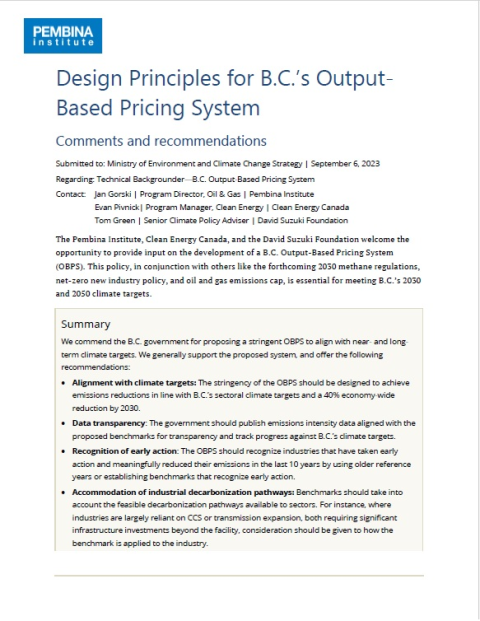The Pembina Institute, Clean Energy Canada, and the David Suzuki Foundation welcome the opportunity to provide input on the development of a B.C. Output-Based Pricing System (OBPS). This policy, in conjunction with others like the forthcoming 2030 methane regulations, net-zero new industry policy, and oil and gas emissions cap, is essential for meeting B.C.’s 2030 and 2050 climate targets.
Summary of our submission
We commend the B.C. government for proposing a stringent OBPS to align with near- and long-term climate targets. We generally support the proposed system, and offer the following recommendations:
Alignment with climate targets: The stringency of the OBPS should be designed to achieve emissions reductions in line with B.C.’s sectoral climate targets and a 40% economy-wide reduction by 2030.
Data transparency: The government should publish emissions intensity data aligned with the proposed benchmarks for transparency and track progress against B.C.’s climate targets.
Recognition of early action: The OBPS should recognize industries that have taken early action and meaningfully reduced their emissions in the last 10 years by using older reference years or establishing benchmarks that recognize early action.
Accommodation of industrial decarbonization pathways: Benchmarks should take into account the feasible decarbonization pathways available to sectors. For instance, where industries are largely reliant on CCS or transmission expansion, both requiring significant infrastructure investments beyond the facility, consideration should be given to how the benchmark is applied to the industry.
Carbon leakage: The government should consider exempting industrial process emissions from highly exposed EITE sectors (cement, aluminum, chemical processing, lime) for a limited amount of time while CCS transport and storage infrastructure is built out in B.C. When access is available, industrial process emissions should no longer be exempted.
Offsets: The use of offsets in the OBPS should be regularly reviewed to ensure alignment with B.C.’s net-zero targets. No offsets from voluntary carbon markets should be eligible.
Scope: We support that compressor exhaust emissions from upstream oil and gas production be included in the scope of this pricing system, and a clear policy approach is needed to address compressor engine exhaust, including improved quantification methods and reporting requirements. We also recommend that any hydrogen plants producing hydrogen from fossil fuels should be considered as part of the oil and gas sector, and subject to relevant new policies and regulations including the OBPS.
Opt-in: We recommend that multiple small conventional oil and gas facilities be allowed to opt in to OBPS coverage as an aggregate.
Carbon removal: Facilities that use carbon removal technology on biomass CO2 emissions should have a mechanism to get credit for those actions, either through offsets or earned credits.
Carbon revenues: Revenues raised by the OBPS should be allocated to promote R&D for technology to reduce hard-to-abate industrial emissions, clean electricity infrastructure, and carbon management. We recommend that a modernized CleanBC Industry Fund become the mechanism to disperse carbon revenues from the OBPS to support industrial decarbonization and should be allocated no less than $200 million annually.
Support for demand-side policies: Alongside their review of the B.C. OPBS, the B.C. government should increase the scope and ambition of its buy-clean policies.










